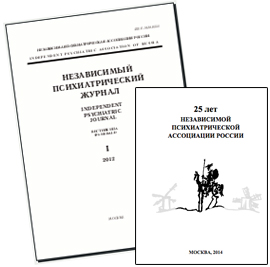Abstracts of №1, 2012
Deficit form of residual condition in manifested progredient forms of schizophrenia (Part 1)
A.G. Mkrtchyan
The study applied clinical psychopathological, clinical cathamnestic and psychometric testing approaches to examine 243 institutionalized chronic patients with manifested progredient forms of schizophrenia in residual phase of the disease.
While differentiating the forms of the outcomes, the study found psychotic form of residual condition in 9.5%, the form with reduced positive symptoms in 35.8%, deficit form in 42.0% and outcome in the form of clinical recovery in 12.8% of the investigated cases. Among the patients with deficit form of the residual condition 39.2% of cases had deficit similar to psychopathy and 54.9% pseudo-organic deficit. Combination of schizoid and pseudo-organic disorders in patients with manifested progredient forms of schizophrenia was observed only in 5.9% of investigated cases.
Clinical and social risk factors of aggressive criminal action against life and health of women with personal disorder. Forensic psychiatric analysis.
V.V.Rusina, E. V.Povaljuhina
The aim of the present study was to examine the relationship between crimes against life and health committed by women with personal disorder and life circumstances versus control group of mentally healthy female offenders. The motivations and mechanisms of aggression were investigated. Forensic psychiatric criteria were assessed. Few independent social risk factors were found to predict violence. Risk factors were associated with cluster B personality disorders, growing up in families with violent parental relationships, perpetration of child abuse and maltreatment. Some risk factors were associated with criminal antisocial environment.
Reduction of alcoholic abstinent syndrome at the present stage
T.A. Kozhina, I.V.Yashkina, A.G.Hofman
Modern data on experimental and clinical study of preparations of various orientation’ influence on speed and features of reduction of alcoholic abstinent syndrome are represented. The important place is given to differentiated medical tactics and combined use of new medicines and forms with standard proved techniques of reduction of alcoholic abstinent syndrome at the present stage. Recommended doses and drugs intake mode are specified.
Pathologocal predisposition to gambling. Part 2
D.A. Avtonomov
Results of investigation of drives, clinical performance, psychopathological phenomena and subjective experience of 103 patients, suffering from pathological predisposition to gambling (F63.0) are presented. Functional value of games and their attractiveness from the point of view of an individual are cleared. Features of clinical performance, behavioral (gambling) patterns are revealed. Phenomenological description of pathological predisposition to gambling is given. Phenomenology of ambling patients’ psychiatric experience at different stages of game dependence is described.
About «minor» psychotherapy in the district psychiatrist’s work
M.E.Burno
District psychiatrists are given concrete advice on how to soften today’s strain in clinics, connected with ‘free medicinal difficulties’ – concrete methods of ‘minor’ psychotherapy, almost dispensing time expenditures and thorough study with acquisition speciality of a psychotherapist.
Keywords: schizophrenia, minor psychotherapy, district psychiatry, psychoneurological clinic, psychotherapy training.
COgnizance of willingness of an incapable patient in the all-medical practice
Yu. N.Argunova
The analysis of legal regulation of rending of a medical aid to incapacitated patients is given. Cases at which medical intervention is possible only with consent of an incapacitated citizen and cases at which judicial decision is required are reviewed.
Weather it is possble to establish invalidity to a person without its consent?
Yu.N.Argunova
Discrepancy of provision of point 24 of Administrative Rules on providing the state service in charring out of a medical social expertise, allowing to establish invalidity to a capable person without his consent are proved. Results of a poll of experts concerning application of this regulation are cited.
Keywords: medical social expertise, disability, capable person, consent.



